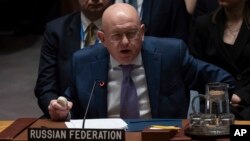Since its unwarranted and illegal invasion of Ukraine in February 2022, the Russian Federation has attempted to change the narrative of who is to blame for the war by repeatedly calling meetings of the UN Security council under the guise of “Threats to International Peace and Security.”
One of the most frequent topics of discussions has been the attack on the Nord Stream natural gas pipelines running through the Baltic Sea.
On September 26, 2022, a series of underwater explosions caused gas leaks in three of the four pipelines, rendering them inoperable. Three separate investigations into the incident, by Denmark, Sweden and Germany, the last of which is on-going, have failed to assign responsibility. Russia continues to call UN Security Council meetings, demanding information from these countries, baselessly accusing them of shielding those responsible, and calling for an international investigation.
The United States condemns “the acts of sabotage against the Nord Stream pipelines and underscor[es] the need for accountability,” said Political Minister Counselor John Kelley. “But let us all be clear. This meeting, like the last one, and the one before that, are not about accountability.”
“Russia has repeatedly called meetings on this topic to spread disinformation, cast aspersions, and discredit ongoing national investigations,” he said.
“It is hard to keep up with Russia’s latest accusations, but one thing remains the same: a victimization narrative.”
In late April, Russia’s representatives once again lamented “sabotage of critical infrastructure.” But they expressed no such regrets with respect to Russia’s own deliberate and on-going attacks against Ukraine’s infrastructure.
Clearly, the Russian Federation’s continuous complaints are a slew of red herrings, intended to distract from its own actions.
“Russia’s claims of noble intentions, the pursuit of justice, and need to protect critical infrastructure are as hollow as they are disingenuous,” said Ambassador Kelley.
“In the same breath, Russia feigns concern over the sabotage of critical infrastructure it values, while wreaking havoc against Ukraine’s cities and targeting Ukraine’s critical infrastructure,” he said.
“And while Russia feigns interest in fact-finding missions and independent investigations, it routinely denies OHCHR [Office of the UN High Commissioner for Human Rights] investigations access to Ukrainian territory temporarily occupied by Russia.”
“Russia claims to want the truth, accountability, and facts, and then vetoes the mandate renewal of an independent UN investigative mechanism like the [Democratic People’s Republic of Korea] 1718 Committee Panel of Experts,” said Ambassador Kelley. “The hypocrisy is as galling as it is predictable.”














